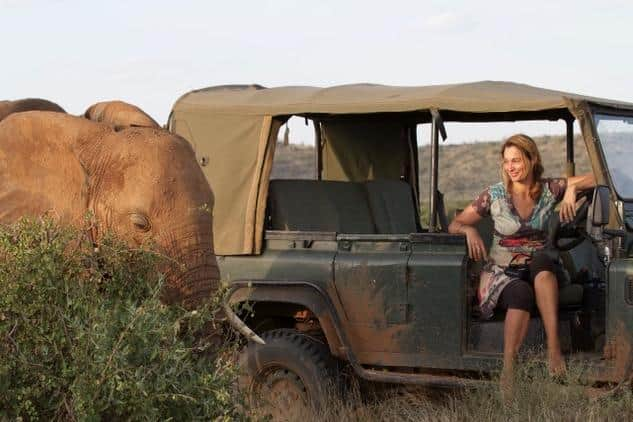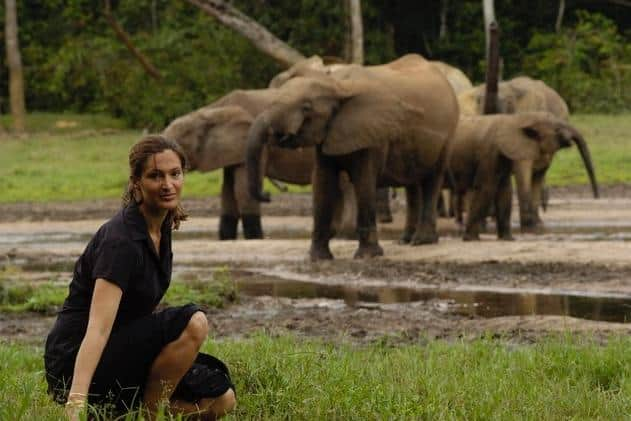Saba Douglas-Hamilton live theatre show shines light on life with elephants in Africa
The conservationist and filmmaker has survived being bitten by a deadly snake, she has seen people “mauled by hyenas and lions, chewed by crocodiles and gored by elephants”.
Advertisement
Hide AdAdvertisement
Hide AdShe was born and raised in east Africa – one of two daughters of respected zoologist Iain Douglas-Hamilton, who began researching elephants in the 1960s and founded the charity Save the Elephants in 1993, and his Kenyan-born wife Oria, an author.
Her first name, Saba, means ‘seven’ in the Swahili language, a name bestowed by Maasai women because she was born on 7 June at 7pm, and was a seventh grandchild.
She is descended from Scottish aristocracy, a great-granddaughter of the 13th Duke of Hamilton, Alfred Douglas-Hamilton, and distant cousin of the current duke, Alexander Douglas-Hamilton, who among his titles is hereditary keeper of the Palace of Holyroodhouse and bearer of the Crown of Scotland.
Her encounter with a carpet viper – a highly venomous species responsible for more human fatalities due to snakebite than all other African snakes combined – happened during an expedition to a remote desert area in the north of Kenya when she was a teenager.
“Someone yelled ‘snake’ but within a second it had bitten me on the heel,” she said.


“I felt its teeth going into my foot, then I felt the ‘fire’. That meant action stations.”
The trek team leapt to her aid, holding her foot inside their jeep’s engine to administer electric shocks from the battery – a technique thought to affect the ions in the snake’s venom and render it less toxic.
Then they bandaged her leg up to the thigh in a bid to slow the spread of the poison.


Advertisement
Hide AdAdvertisement
Hide Ad“It was like lava moving up my leg, and they shocked me for two hours,” she said.
“I was in so much pain I had to focus every fibre of my being on remembering to breathe.
“I couldn’t move so I just locked my eyes on the moon.”
An SoS message was sent to her father the next day and flying doctors were dispatched to evacuate her to hospital.
“I lost consciousness in the plane,” she said.
“I don’t remember the first three days.
“I turned blue, and thought I might non live.
“But on day three I woke up and the sun was pouring in the window like liquid gold.
“And I thought, ‘I’m alive’.”
Now audiences in Scotland and across the UK will have a chance to hear first-hand about her adventurous life and work to protect endangered African elephants in a new show which kicks off this week.
It’s true, elephants never forget, she says.
What is perhaps less well known is that these long memories – and life skills – are learned mainly from their mothers and grandmothers.
Knowledge and behaviour are passed on to younger animals by the matriarchs in the herd – from locating the best food and water supplies to navigating migration routes, recognising danger and learning how to protect each other.
Douglas-Hamilton, a graduate of the university of St Andrews, knows all this from both personal experience and from her father’s pioneering research.
Advertisement
Hide AdAdvertisement
Hide AdBut African elephants today face a growing number of challenges in the fight for survival.
The latest estimates suggest there are only around 415,000 left across the continent, with climate change, spread of human development, changing land use and the international ivory trade being blamed for their disappearance.
Douglas-Hamilton, who runs an upmarket safari business in Kenya’s Samburu national park with her husband Frank Pope, chief executive of Save the Elephants, explains how populations have been affected over the years as desire for ivory has risen and fallen.
By the time the international trade ban was established in 1989, the continent had lost around half of its elephants.
Numbers began to bounce back over the following two decades but increasing demand from the east has sparked further surges in demand for tusks in recent years.
Encouragingly, the situation has been improving – thanks to conservation efforts and action to stamp out wildlife crime.
But Douglas-Hamilton warns that careful planning is needed as human populations increase and development spreads to avoid conflict between people and elephant herds.
“The next big issue is competition,” she said.
“Wild areas are being cut up with roads, railways, buildings.
“It’s causing loss of habitat and connectivity.
Advertisement
Hide AdAdvertisement
Hide Ad“Some elephants are following routes their grandmothers took, but faced with a confusing new landscape can lead to conflict, with animals showing aggressive behaviour.
“Droughts have seen the animals coming into towns, breaking into water tanks and food supplies and destroying homes.
“It’s a delicate balance.”
Her show is an inspiring and heart-warming look at her family’s efforts to safeguard the giant mammals, with stories describing what life is like for the endangered herds and the work being done to fight poaching, indiscriminate killing and trafficking.
It will feature tales of everything from the courage and commitment of local Samburu warriors who regularly risk their lives fighting poachers and tending to sick and injured animals to the antics of long-time elephant “friends”.
“Ten years ago elephants across Africa were facing catastrophic declines due to poaching for their ivory,” Douglas-Hamilton said.
“Thanks to a global coalition of scientists, activists, organisations and nations the ivory trade is now on the back foot and poaching no longer threatens any major elephant population.
“This is a rare, good news story for the planet.
“I’m thrilled to be able to bring it to life – and to discuss the challenge of forging harmonious coexistence between elephants and humans.”
In the Footsteps of Elephants kicks off on Tuesday in Bury St Edmunds and ends with three Scottish appearances – in Aberdeen, Stirling and Inverness – in October.
Comments
Want to join the conversation? Please or to comment on this article.
